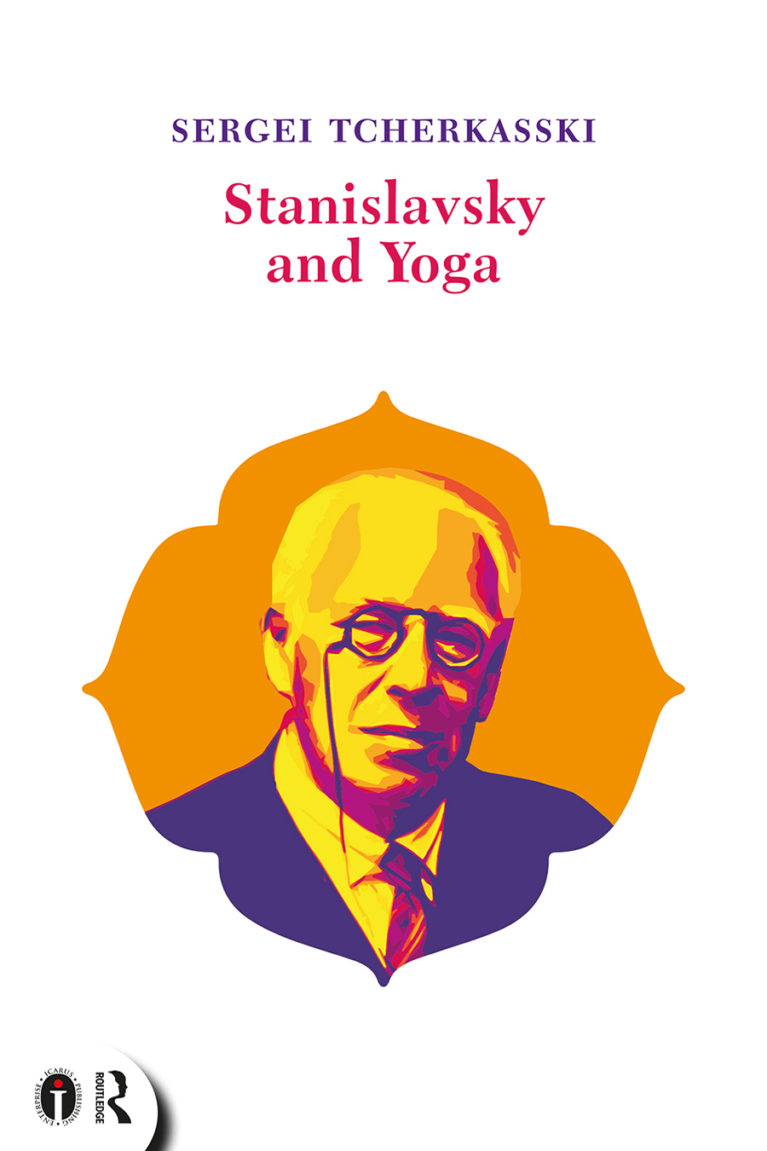- Autor: Sergei Tcherkasski
- Przekład: Vreneli Farber
- Wydawnictwo: Routledge, Icarus Publishing Enterprise
- Data wydania: 2016
- ISBN: 978-1-138-69178-0
- Format: 135×215mm
- Liczba stron: 126
- Rodzaj oprawy: miękka
Stanislavsky and Yoga
Sergei TcherkasskiPlease note that we ship only to addresses within Poland. If you want to order a book and have it shipped to an international address, email us at ksiegarnia@grotowski-institute.pl.
Translated from Russian by Vreneli Farber
This book deals with one of the most important sources of the Stanislavsky System – Yoga, its practice and philosophy. Sergei Tcherkasski carefully collects records on Yoga in Stanislavsky’s writings from different periods and discusses hidden references which are not explained by Stanislavsky himself due to the censorship in his day. Vivid examples of Yoga-based training from the rehearsal practice of the Moscow Art Theatre and many of Stanislavsky’s studios (the First Studio in 1910s, the Second Studio and Opera Studio of the Bolshoi Theatre in 1920s, Opera-Dramatic Studio in 1930s) are provided.
The focus of Tcherkasski’s research consists of a comparative reading of the Stanislavsky System and Yogi Ramacharaka’s books, which were a main source for Stanislavsky. Accordingly, Tcherkasski analyzes elements of the System based on Yoga principles. Among them are: relaxation of muscles (muscular release), communication and prana, emission of rays and reception of rays, beaming of aura, sending of prana, attention, visualizations (mental images). Special attention is paid to the idea of the superconscious in Yoga, and in Ramacharaka’s and Stanislavsky’s theories.
Tcherkasski’s wide-ranging analysis has resulted in new and intriguing discoveries about the Russian master. Furthermore, he reveals the extent to which Stanislavsky anticipated modern discoveries in neurobiology and cognitive science.
In this book Tcherkasski acts as a researcher, historian, theatre director, and experienced acting teacher. He argues that some forty per cent of basic exercises in any Stanislavsky based actor training program of today are rooted in Yoga. Actors, teachers, and students will find it interesting to discover that they are following in the footsteps of Yoga in their everyday Stanislavsky based training and rehearsals.
Sergei Tcherkasski is Head of an Acting Studio in the renowned Saint Petersburg Theatre Arts Academy (established in 1779). He is Professor of Acting and Directing and holds a Ph.D. for his research into the education of directors in Russia. His second dissertation (D.Sc.) resulted in the book Acting: Stanislavsky – Boleslavsky – Strasberg (History, Theory and Practice) (2016).
His other Russian-language books include Stanislavsky and Yoga (2013), Valentine Smyshliaev – Actor, Director and Teacher (2004), Sulimov’s School of Directing (2013). They form a kind of trilogy representing Tcherkasski’s professional family tree which grows directly from Stanislavsky to Smyshliaev (member of the First Studio of Moscow Art Theatre) and then to Sulimov (one of the leading Russian teachers of directing of the twentieth century).
Tcherkasski has directed more than three dozen classical and modern plays. Two of his productions – Dangerous Liaisons and Great Catherine – ran in Saint Petersburg for twelve and sixteen years respectively. His international directing credits include Great Catherine by Shaw and Duck Hunting by Vampilov at RADA (London), The Inspector General by Gogol at the National Theatre of Romania (Bucharest) and Flight by Bulgakov at NIDA (Sydney).
Prof. Tcherkasski’s students work in leading Russian companies; they become award-winning actors and directors including nominees and winners of the Golden Mask Award. Tcherkasski has led workshops in more than forty theatre schools all over the world.
Considering that 50% of all books in translation worldwide are translated from English, whilst only 6% are translated into English, Odin Teatret (Denmark), the Grotowski Institute (Poland) and Theatre Arts Researching the Foundations (Malta) have created Icarus Publishing Enterprise, whose purpose is to present texts by artists and scholars in English translation about the practice and vision of theatre as a laboratory.
Icarus was the name of a schooner that sailed from Civitavecchia in 1697 with a cargo destined for a Venetian merchant resident in the international trading port of Smyrna. Its mythological name was intended, paradoxically, as a bringer of good luck, to ward off shipwrecks. In its hold, the small vessel also carried a luxurious curtain never used before, a few painted scenes and a number of scripts and musical scores from a theatre erected in Rome by Queen Cristina of Sweden and torn down on the order of Pope Clement X.
Similarly to that schooner, Icarus Publishing Enterprise wants to ferry into international waters writings of theatre artists and scholars who, despite their value, risk a limited circulation because of the language in which they have been written. We know by experience that theatre studies are effective only if they succeed in piercing the wrappings of academic commonplaces and inspire those wishing to do theatre. Many think that the theatre has no future. This may be so. But one thing is certain: in the future there will surely be something that we are unable to imagine now, but that will be called theatre.




